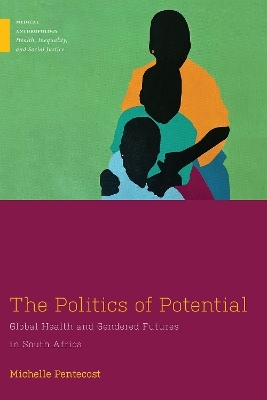
The Politics of Potential
Global Health and Gendered Futures in South Africa
Seiten
2024
Rutgers University Press (Verlag)
978-1-9788-3748-5 (ISBN)
Rutgers University Press (Verlag)
978-1-9788-3748-5 (ISBN)
In The Politics of Potential, physician-anthropologist Michelle Pentecost investigates The First 1000 Days, an early life intervention project that seeks to end child malnutrition in South Africa, the ways in which this program has been adopted, and how it impacts child-bearing women in South Africa in powerfully gendered and racialized ways.
The first one thousand days of human life, or the period between conception and age two, is one of the most pivotal periods of human development. Optimizing nutrition during this time not only prevents childhood malnutrition but also determines future health and potential. The Politics of Potential examines early life interventions in the first one thousand days of life in South Africa, drawing on fieldwork from international conferences, government offices, health-care facilities, and the everyday lives of fifteen women and their families in Cape Town. Michelle Pentecost explores various aspects of a politics of potential, a term that underlines the first one thousand days concept and its effects on clinical care and the lives of childbearing women in South Africa. Why was the First One Thousand Days project so readily adopted by South Africa and many other countries? Pentecost not only explores this question but also discusses the science of intergenerational transmissions of health, disease, and human capital and how this constitutes new forms of intergenerational responsibility. The women who are the target of first one thousdand days interventions are cast as both vulnerable and responsible for the health of future generations, such that, despite its history, intergenerational responsibility in South Africa remains entrenched in powerfully gendered and racialized ways.
The first one thousand days of human life, or the period between conception and age two, is one of the most pivotal periods of human development. Optimizing nutrition during this time not only prevents childhood malnutrition but also determines future health and potential. The Politics of Potential examines early life interventions in the first one thousand days of life in South Africa, drawing on fieldwork from international conferences, government offices, health-care facilities, and the everyday lives of fifteen women and their families in Cape Town. Michelle Pentecost explores various aspects of a politics of potential, a term that underlines the first one thousand days concept and its effects on clinical care and the lives of childbearing women in South Africa. Why was the First One Thousand Days project so readily adopted by South Africa and many other countries? Pentecost not only explores this question but also discusses the science of intergenerational transmissions of health, disease, and human capital and how this constitutes new forms of intergenerational responsibility. The women who are the target of first one thousdand days interventions are cast as both vulnerable and responsible for the health of future generations, such that, despite its history, intergenerational responsibility in South Africa remains entrenched in powerfully gendered and racialized ways.
MICHELLE PENTECOST is a physician-anthropologist and senior lecturer in global health and social medicine at King's College London.
Foreword by Lenore Manderson
Introduction
1 The First 1000 Days: Origin Stories
2 Situated Biologies: The View from Khayelitsha
3 The Traveling Technology of Mother and Child
4 Life Between Protocols
5 Intergenerational Transmissions: The Work of Time
6 Ambivalent Kin: On Gender and Violence
Conclusion: The Politics of Potential
Acknowledgments
Notes
Bibliography
Index
| Erscheinungsdatum | 21.12.2023 |
|---|---|
| Reihe/Serie | Medical Anthropology |
| Zusatzinfo | 6 B-W, 1 color, 2 tables |
| Verlagsort | New Brunswick NJ |
| Sprache | englisch |
| Maße | 152 x 229 mm |
| Gewicht | 64 g |
| Themenwelt | Medizin / Pharmazie ► Medizinische Fachgebiete ► Pädiatrie |
| Studium ► Querschnittsbereiche ► Prävention / Gesundheitsförderung | |
| Sozialwissenschaften ► Ethnologie | |
| Sozialwissenschaften ► Soziologie | |
| ISBN-10 | 1-9788-3748-8 / 1978837488 |
| ISBN-13 | 978-1-9788-3748-5 / 9781978837485 |
| Zustand | Neuware |
| Informationen gemäß Produktsicherheitsverordnung (GPSR) | |
| Haben Sie eine Frage zum Produkt? |
Mehr entdecken
aus dem Bereich
aus dem Bereich
das Manual zur psychologischen Gesundheitsförderung
Buch | Hardcover (2023)
Springer Berlin (Verlag)
CHF 55,95
Wissenschaftlich basierte Empfehlungen, Tipps und Ernährungspläne für …
Buch (2022)
Thieme (Verlag)
CHF 69,95


